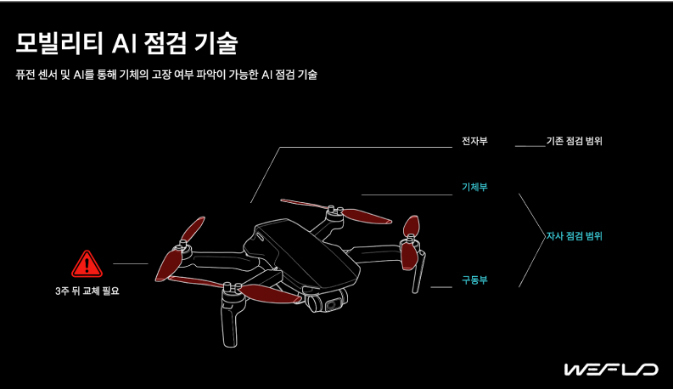[2024 Pangyo Startup Zone Interview ⑨]
WEFLO COO
Integrating contactless sensors and AI technology to complete inspections in an instant
Get more than 98% accuracy for Yeji maintenance...database advancement
Pangyo Startup Zone is the largest startup support cluster in Korea established in 2017 by the Ministry of SMEs and Startups to foster promising startups in new industries. It is jointly operated by the Korea Institute of Startup and the Gyeonggi Center for Creative Economy Innovation (hereinafter referred to as the "Gyeonggi Innovation Center") and is developing more than 100 technology start-ups every year. Meet the CEO of a tenant company who dreams of becoming a unicorn in the future.
The government selected artificial intelligence (AI), advanced mobility, advanced robots, secondary batteries, and quantum computing as the next-generation science and strategic technology industries that will lead global future competitiveness. While related industries are already showing rapid growth, interest in advanced mobility based on autonomous driving is also increasing.
The air traffic revolution, which started with drones, is being advanced into UAM (urban air mobility) industries such as air taxis, and is expected to be commercialized in earnest as early as 2030. However, safety problems caused by the increase in new air traffic still raise concerns. Wiplo is a startup that started with the idea of eliminating these worries that are coming. We met with Wiplo, the only AI aircraft inspection company in Korea responsible for the safety of next-generation air mobility.

Q. What kind of business is it?
Founded in 2022, Wiplo is developing fusion sensors and AI technologies that can establish a systematic database by checking the state of future air mobility aircraft such as drones and air taxis in a non-contact manner within a few seconds.
Q. What is the reason or purpose of starting this business?
Currently, there is a major shift from fossil fuel-based devices to electric mobility. However, the biggest obstacle to commercialization is the lack of technology areas that ensure the safety of mobility.
I have a Ph.D. in Electrical and Electronic Engineering from KAIST and work as a researcher at Harvard Medical School with expertise in AI and data science. The main members of Wiplo were also researchers who were originally developing weapons systems in Hanwha System. Kim Eui-jung, CEO of Wiplo, received a doctorate in information and communication engineering from KAIST, and has been closely evaluating the possibility of this area while working as a part leader of LG Electronics' CTO Smart Car Research Institute, Hanwha General Research Institute, and Hanwha System Future Technology Lab AAM (Next Generation Aviation Mobility) MRO (Maintenance Operation).
The most important factor in creating a weapon system is to create an inspection system, and I thought that future mobility must also require a smart and unmanned inspection system. Recognizing this possibility and through the proposed idea, it became an in-house venture of Hanwha System, and since then, it has come out and has been established separately to further develop the business.

Q. What are the main business items and how they work?
It is an item that checks the safety status of mobility within seconds in a non-contact manner, and the operating principle measures the physical quantity originally generated by mobility to detect state abnormalities and predict the possibility of failure. It can be expanded to unmanned/automated based on a contactless method.
This is the era of drones, but if the era of full-fledged UAM comes, safety inspection technology can become very important. Although it is difficult to mount such a system on drones in terms of cost and technology, UAM can be made in the form of mounting Wiplo's contactless inspection technology as a system on the aircraft.
Gas safety inspections by the naked eye of a person always have a high probability of misjudgment, and the quality of inspections can vary greatly depending on differences in individual knowledge and experience. However, utilizing Wiplo's sensors and artificial intelligence can effectively solve this problem and dramatically save time and money.
Q. What is more competitive than other companies?
As far as I know, there are no companies that have specialized solutions for aviation mobility inspection like Korean companies. However, as the industrial area grows, there is a possibility that mobility manufacturers will expand their technology areas with inspection solutions in the future.
Our company's competitiveness is that it can optimize sensors and boards on its own and provide advanced services through AI models developed with theoretical analysis, and securing databases that have been accumulated since last year is acting as our competitiveness.
The maintenance accuracy of mobility can be increased to 98% by using WeFlow's maintenance service. The accuracy of the solution is currently a probabilistic figure from the perspective of predictive maintenance. Forewarning is the prediction that a problem may occur in a few days.
Regarding failure judgment, not predictive maintenance, 99.8% of accuracy has been secured. If more databases are secured through various additional projects in the future, it is expected that the accuracy of preliminary maintenance can be increased to close to 100%.
Q. Tell me about the marketability (evaluation) of the business.
Our company is ultimately looking at future AAM (Advanced Air Mobility), such as air taxis, and commercialization services are expected to come out sooner than expected. At home and abroad, announcements on the possibility of commercialization are continuing before 2030.
I think that future aviation mobility has great industrial potential in that it greatly affects related industries (communications, infrastructure, transportation systems, etc.) beyond just new means of transportation. Although it may be later than planned, it is evaluated as a market with great potential in the future as it is expected to open significantly in the end, whether for environmental or business reasons. Our company is aiming for global business in the long run. As the UAM industry is the most promising industry in the future mobility market, we will strive to be evaluated as a company that provides the best inspection solution in the world, not the best in Korea.
Q. Investment attraction status and business plan
In the aerospace start-up industry, it is known that it is very rare for products to be released, successfully attract investment, and even related services to be released after two years of establishment like Wiplo. It has received investments from several strategic investors (SI) and financial investors (FI) and recently completed bridge investments.
After receiving 2.5 billion won from the pre-A series in July last year, it has achieved accumulated investment of 6.3 billion won in two and a half years after its establishment. It is planning to attract Series-A investment around the second and third quarters of next year.
As part of the Ministry of Land, Infrastructure and Transport's "Drone Delivery Demonstration Project" last year, Wiplo completed the construction of a "Bertifit" that enables sensors and AI-based unmanned inspection at 23 locations across the country. This year, it plans to expand integrated infrastructure that enables not only drone inspection but also control and logistics delivery, such as drone delivery centers.
Wiplo is conducting a pre-inspection business with drones before the arrival of the UAM market, and is expanding its business area by supplying inspection solutions for electric vehicles. Big data and technology obtained in this process are expected to be of great help in enhancing competitiveness in the future.
In that sense, it is important to collaborate with companies with excellent technology and mobility manufacturers. We are working with major UAM developers and aircraft developers in the United States and Japan, and will strengthen cooperation with empirical and highly likely companies.
Q. What is the most helpful part of a company in Pangyo's start-up zone?
It is most helpful to receive major infrastructure (office, conference room, etc.) for corporate operation at a low cost. Various linkage programs provided by the Gyeonggi Innovation Center are also a big foundation for the company's growth.
